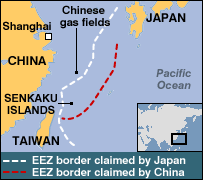 Historic port call marks Japan-China thaw
Historic port call marks Japan-China thawThe arrival of a Japanese war ship in a Chinese port and the recent announcement of a joint gas-exploration deal signal improving bilateral ties, but territorial disputes remain unresolved.
By Jonathan Adams
Christian Science Monitor,June 25, 2008
A Japanese war ship made a port call in China this week for the first time since World War II, as East Asia's two leading powers seek to forge stronger ties and turn the page on their troubled past.
The visit comes on the heels of a landmark deal last week between Tokyo and Beijing to jointly develop gas fields in the East China Sea, and an ice-breaking visit by Chinese President Hu Jintao to Japan in May.
Analysts see these events as part of a broad trend of warming relations between the historic rivals. But they cautioned that the two nations have failed to resolve dangerous, underlying disputes in the East China Sea.
The Associated Press reported that the Japanese destroyer Sazanami arrived Tuesday in Zhanjiang, a port city in southern Guangdong Province, on what was officially a humanitarian relief mission.
The navy vessel with 240 crew members carried blankets, medical supplies and other relief goods for survivors of China's devastating May 12 earthquake that killed more than 69,000 people.
Chinese state media showed pictures of the ship arriving with Chinese sailors lined up on the dock in white uniforms under the two countries' flags.
The destroyer Sazanami was paying a return visit for a port call made by the Chinese guided missile destroyer Shenzhen to Tokyo in November, the first visit by a Chinese military vessel to Japan since the war.
Agence France Presse reported that Chinese residents welcomed the ship, but that a strong sense of rivalry persists.
Local residents said the port call was a promising sign of warming ties, but amid the words of welcome was an undertone of pride that China was increasingly dealing with Japan as an equal rather than a poor cousin. "Originally Japan had money and they bullied us, but now we've developed so much that even if they wanted to bully us, they couldn't," said Xing Chen, a local driver.
The Times noted the lingering sensitivities in China over allowing Japanese military visits.
It was such sensitivities that scuppered a plan last month for Japanese soldiers to set foot once again on Chinese soil, at China's invitation, to airlift tents and relief supplies to earthquake victims. Fears of public anger persuaded Japan to switch the cargo to chartered flights instead.
Anti-Japanese sentiment remains widespread in China. That's due to bitter memories of Japan's brutal occupation of China in the 1930s and 1940s, and what many Chinese and other observers see as Japan's failure to make a full, formal apology for wartime atrocities.
In the last two years, the Chinese government has shown a willingness to play down such grievances in order to improve bilateral ties. That policy shift came after former Japanese prime minister Junichiro Koizumi left office in 2006. Mr. Koizumi had irked China with visits to a controversial war shrine.
The Christian Science Monitor reported in May on President Hu Jintao's trip to Japan, which paved the way for recent breakthroughs. In Tokyo, Mr. Hu played ping-pong with a Japanese table tennis star, praised the Japanese people, and urged long-term friendship between the two nations.
That softer policy line has begun to bear fruit. Last Wednesday, China and Japan announced a deal on joint exploration of natural gas fields, reported the Associated Press.
The Daily Yomiuri shows that the deal was hailed as a major step forward since the two countries' competing claims in the gas and oil-rich East China Sea are one of the main sticking points in bilateral relations.
Security experts warn the East China Sea is a potential flashpoint for conflict between one of Asia's strongest navies – Japan's – and its rapidly rising naval power, China.
The Financial Times noted that despite the gas deal, the countries' territorial dispute has not been resolved.
Beijing shows no sign of softening its underlying territorial claims in the East China Sea, which clash with those of Japan. "China does not accept the Japanese so-called 'median line'," in the East China Sea, insisted Wu Dawei, vice-foreign minister yesterday.
The two sides are also still far from agreement on regional security arrangements, says Zhu Feng of Peking University.
"There is not yet any great strategic depth to the relationship. What has happened has been an exercise of self-restraint to prevent the countries from entering on a collision course," Prof Zhu says.
Writing in the China Brief, which is published by The Jamestown Foundation, earlier this month, James Manicom, an expert on China-Japan maritime disputes, noted that the two countries' spat in the East China Sea goes beyond gas and oil rights. Chinese naval vessels routinely violate a 2001 agreement by entering Japan's exclusive economic zone, Chinese military intelligence vessels continue research in disputed areas, and fishing disputes are frequent, writes Manicom.
In short, whatever progress was made on the proposed joint development scheme at the recent summit, it will be quite sometime before the East China Sea becomes the sea of "peace, cooperation and friendship."









No comments:
Post a Comment